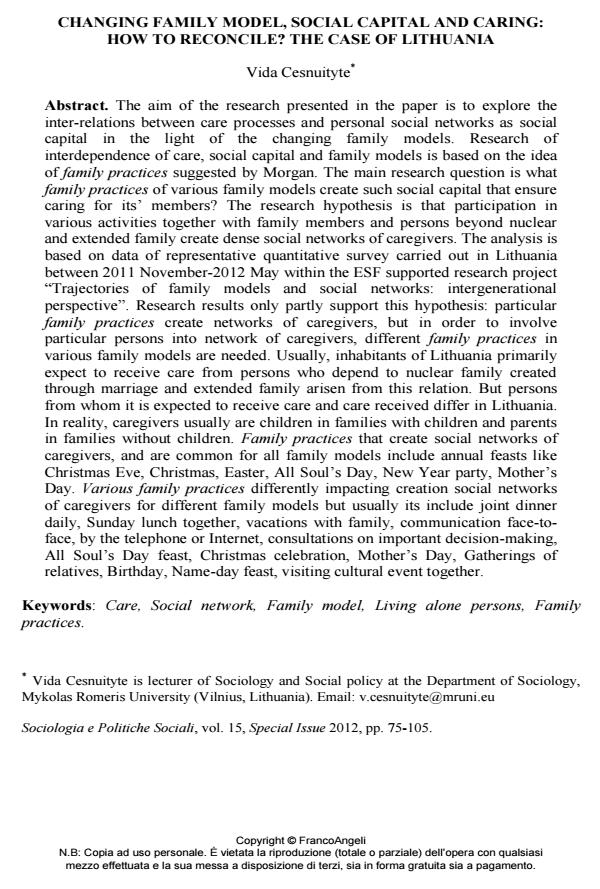Changing family model, social capital and caring: how to reconcile? the case of Lithuania
Journal title SOCIOLOGIA E POLITICHE SOCIALI
Author/s Vida Cesnuityte
Publishing Year 2013 Issue 2012/Suppl. 3
Language English Pages 31 P. 75-105 File size 591 KB
DOI 10.3280/SP2012-SU3005
DOI is like a bar code for intellectual property: to have more infomation
click here
Below, you can see the article first page
If you want to buy this article in PDF format, you can do it, following the instructions to buy download credits

FrancoAngeli is member of Publishers International Linking Association, Inc (PILA), a not-for-profit association which run the CrossRef service enabling links to and from online scholarly content.
The aim of the research presented in the paper is to explore the inter-relations between care processes and personal social networks as social capital in the light of the changing family models. Research of interdependence of care, social capital and family models is based on the idea of family practices suggested by Morgan. The main research question is what family practices of various family models create such social capital that ensure caring for its’ members? The research hypothesis is that participation in various activities together with family members and persons beyond nuclear and extended family create dense social networks of caregivers. The analysis is based on data of representative quantitative survey carried out in Lithuania between 2011 November-2012 May within the ESF supported research project "Trajectories of family models and social networks: intergenerational perspective". Research results only partly support this hypothesis: particular family practices create networks of caregivers, but in order to involve particular persons into network of caregivers, different family practices in various family models are needed. Usually, inhabitants of Lithuania primarily expect to receive care from persons who depend to nuclear family created through marriage and extended family arisen from this relation. But persons from whom it is expected to receive care and care received differ in Lithuania. In reality, caregivers usually are children in families with children and parents in families without children. Family practices that create social networks of caregivers, and are common for all family models include annual feasts like Christmas Eve, Christmas, Easter, All Soul’s Day, New Year party, Mother’s Day. Various family practices differently impacting creation social networks of caregivers for different family models but usually its include joint dinner daily, Sunday lunch together, vacations with family, communication face-toface, by the telephone or Internet, consultations on important decision-making, All Soul’s Day feast, Christmas celebration, Mother’s Day, Gatherings of relatives, Birthday, Name-day feast, visiting cultural event together.
Keywords: Care, Social network, Family model, Living alone persons, Family practices.
- The Palgrave Handbook of Family Sociology in Europe Rita Gouveia, Anna-Maija Castrén, pp.259 (ISBN:978-3-030-73305-6)
Vida Cesnuityte, Changing family model, social capital and caring: how to reconcile? the case of Lithuania in "SOCIOLOGIA E POLITICHE SOCIALI" Suppl. 3/2012, pp 75-105, DOI: 10.3280/SP2012-SU3005